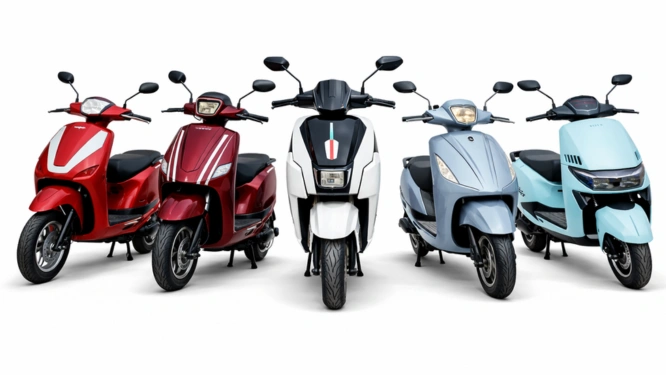EV Controllers
Title: Intelligent Controller’s Guide: The Best EV Motor Deliverables.
A motor constructed for the use of electrical vehicle driving is an element that determines the efficiency performance of electronic vehicle (EV) controller. It is a very small yet most complex device that acts to stop the flow of power from the battery to the motor in case of sudden engine acceleration or a sudden brake in the vehicles and hence is a very useful device to reduce the overall energy consumed in the effective braking of the vehicles. Taking into account the above, it is possible to conclude that the task and assignment of EV controllers is particularly important to the future of the mobility industry. Here you will know the definition of EV Controller and about the working principle of EV Controller and also about the type of EV Controller and its impact on EV performance and so on.
Understanding EV Controllers
EV controller as the name suggests can be simply defined as a control circuit which controls the charging of the current coming from a battery pack to a motor. It acts as the demand side, the interface between the driver’s request and the micro battery and the motor that helps to regulate energy flow to propel the vehicle. The differences in the readings from the throttle position sensors and the brake sensors’ signals are representative of the drivers’ desire and the controller regulates the power in accordance.
Functions of EV Controllers
1. Power Regulation: EV controllers act in a similar manner whereby the amount of power that is made available to the electric motor varies with the position of the accelerator pedal. The block devices function is to regulate the voltage and current rate from the battery pack to the motor to ensure the use of as little energy as needed and delivers the required performance power.
2. Regenerative Braking: Another one of the attractive advantages of using an EV is the regenerative braking in which the vehicle recovers the kinetic energy which is converted into electricity. EV controllers help by managing the input and output of energy so that the highest efficiency and mileage is achieved by shifting between the accelerating force and the deceleration and recharging the battery.
3. Fault Detection and Diagnostics: EV controllers continuously monitor factors such as temperature, voltage, and amperage for problems in the system. They have such functions as that they can initiate certain series of functions which will protect the component parts and ring the bell to the driver or the maintenance crew in case of a malfunction.
4. Thermal Management: As such heat plays a vital role in the function and longevity of EV components. New EV controllers also incorporate thermal management devices which target the control of temperature in motors and power electronics.
5. Communication Interface: New EV controller has mostly been designed to have CAN or Ethernet port to facilitate data transfer to other controller such as OC, BMS and telematics.This facilitates total interconnection of the different components of the electric driveline.
Types of EV Controllers
1. AC Controllers: AC Controllers are automatically used in EV’s when they are equipped with AC induction or permanent magnet synchronous motors. Such types of motors are operated by supplying the AC power and are used to convert DC power output form the battery into the AC power. AC controllers are more preferable as they have the most speed and torque control options that are excellent most especially in the case of high performing systems.
2. DC Controllers: DC controllers are simpler and hence are preferred for drives in EVs driving DC motors. They control the flow of DC current from the battery to through the motor, and thus the motor may move. Heating and cooling regulators do not always have the expected efficiency but they are more sophisticated and offer a better service.
3. Integrated Motor Controllers: These representatives of the family are compact integrated motor controllers which incorporate an AC motor and its controller in one structural design with no need for any additional wiring of separate units. These are the type of controllers that is used in electric bicycles, scooters and smaller EV types but not in the larger types.
On the influence of the EV Controller on the car’s performance.
Some of the most important contributors to the performance of electric cars include the design of the motor in use as well as the battery capacity and the body design. Adequately controlling the power given to the motors of an electric drivetrain is thus indispensable in releasing the maximum acceleration required from a stationary starting point or in making dynamic passes.
2. Efficiency and Range: Economic efficiency in the use of energy in the car is critical for the effective operation of such cars as electric vehicles. Powertrain controllers work so that power delivery is regulated, depending on state parameters such as road and weather conditions and driving behavior.
3.The car owners can’t change the car’s performance by personalization but they can modify vehicles according to their preferences; for example, the car owners are able to adjust throttle response, the regenerative braking & maximum torque on the vehicles.
4. Reliability and Safety: The controller structure elements of the EV must also be sufficiently robust and reliable to ensure the safety and stability of the EV. These usually have the enablement diagnostics and other safety and critical functions to ensure that they achieve a satisfactory level of operation under different conditions. The controllers play an important role in the safety of electric vehicles due to the fact that they allow monitoring of all the systems involved in the car, and the correction of any errors that may occur constantly.








